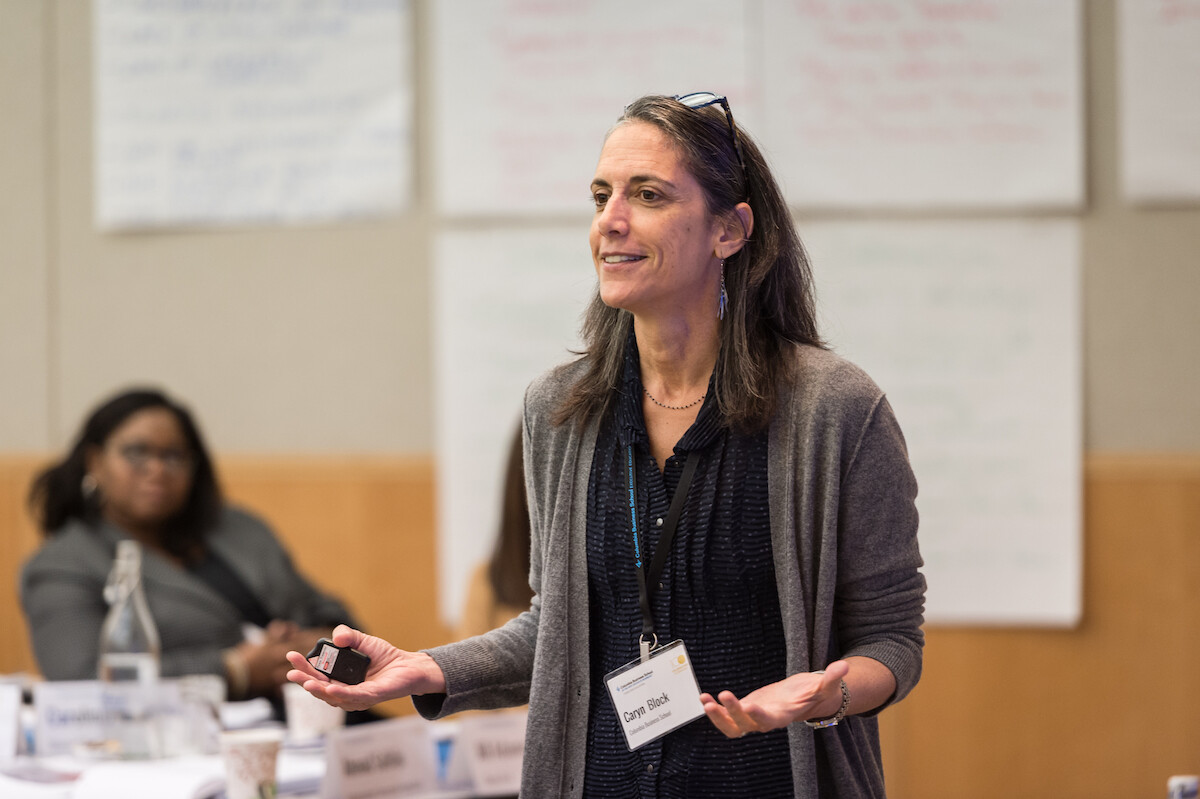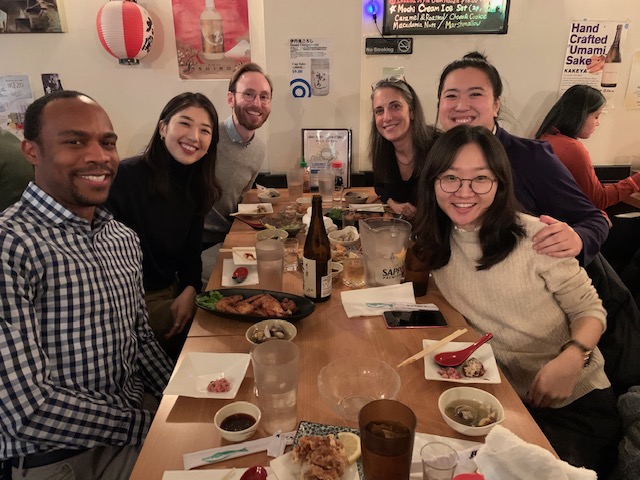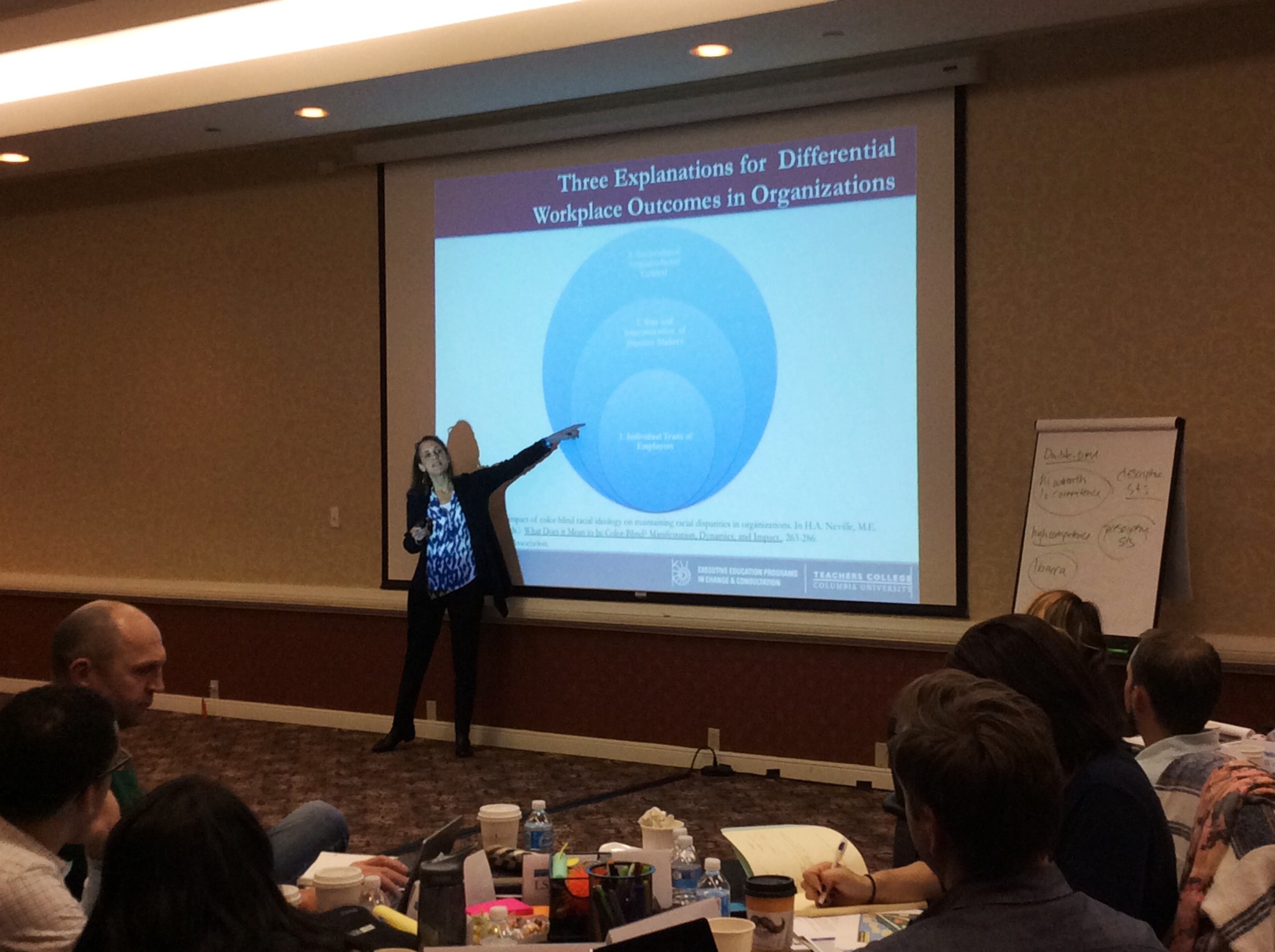For TC’s Caryn Block, her transformative research and pedagogy are woven with one common thread.
“It’s a multi-generational community that we’re creating through the research,” shares the Professor of Social and Organizational Psychology, who through her years at Teachers College has shaped her scholarship on diversity dynamics in partnership with students through an astute care for their interests and experiences.

“What is it like to have a career in a system where the stereotype about your group's underrepresentation is always present? These are the questions we have explored,” explains Block, whose research focuses on how women and underrepresented minorities cope with stereotypes in the workplace.
“I make it a point to study dynamics based on what my doctoral students' interests are,” says Block, who can proudly detail which former students are continuing this work through their own scholarship post TC. “I want to explore the issues that matter most to them — to their communities.”
For Eccho Yu (M.A., 13, Current Ph.D. Student), that mentorship parlayed into applying her work in talent strategy and analytics at LinkedIn. “Collaborating with Caryn is like having a lighthouse in my scholarly journey,” says Yu.“ She guides and directs me through the unknown territory of research, helping me to reach my destination, while providing a safe place for me as an individual."

Block and her research group. Pictured (left to right): doctoral students Julian McNeil and Jean Sohn, Joshua Elmore (Ph.D. '20), Professor Caryn Block, doctoral student Lea Lynn Yen, and Aitong Li (Ph.D. '21).
Learn more about Block’s collaborative research below:
Exploring Systematic Stereotype Threat
A major component of Block’s work unpacks the long-term effects of systematic stereotype threat, a chronic inherent challenge that occurs when an individual is in an ongoing system that is characterized by gender or racial disparities.
Through an NSF Advance grant, Block partnered with her doctoral student at the time, Mateo Cruz (Ph.D. ‘20), to conduct a qualitative study about systematic stereotypes focused on women in STEM that revealed three coping patterns that women use to contend with stereotypes over the course of their career. She found that some women emphasized their science identity, while they downplayed their gender identity, trying to fend off the stereotypes and demonstrate that they didn’t apply to them. Other women confronted stereotypes directly and stood up for themselves and other women focusing on changing the systemic barriers they faced. Still, other women were aware of the systemic hurdles that stereotypes created for them but focused on taking care of themselves in a hostile system.
Ultimately, Block concluded that a “one size fits all” approach to diversity practices may do more harm than good. Yet more importantly, interventions should focus on fixing the system and not the individuals within the system.
“The bottom line is that when you have a career in a broken system, it requires active coping strategies on behalf of the individuals in the situation. Everyone’s strategy looks different, and we need to be more responsive to that.”

Microaggressions Against Asian Individuals in the Workplace
In addition to examining how women in STEM are affected by systemic stereotype threat, Block also examines the phenomenon’s impact on Asian individuals in the workplace — a topic of specific interest to her students.
The work also relates to the research focus of TC colleague Derald Wing Sue, Professor of Psychology and Education, a pioneer in multicultural psychology who is most commonly known for his foundational research on microaggressions.
The two would go on to collaborate, with Block authoring chapters in two of Sue’s publications.
“Caryn’s research around workplace disparities has been transformative in my work,” shares Sue, an expert on microaggressions in the workplace. “Her research has bridged the understanding of organizational psychology and individual/structural inequities. Yet most importantly, [Block] carries the unique ability to translate theory into practice while making it understandable to all.”
Block and her students, Jennifer Kim (Ph.D. ‘19), Duoc Nguyen (Ph.D. ‘20) and doctoral student Eccho Yu (M.A. ‘13), found that more often than not, Asian individuals were described as “hardworking” and “diligent.” This research is an example of the model minority myth, a stereotype about a specific group of individuals that perpetuates a “positive” false narrative. Still, the study revealed that many Asians experience both blatant and subtle forms of discrimination, despite these assumptions.
“While these stereotypes seem like a good thing, the problem is that it implies a false expectation,” shares Block, noting that many individuals expressed they felt pressured to work long hours or out-perform their colleagues.
Other microaggressions implied that Asian professionals enjoy working with statistics or technical data. “Many of the Asian participants in our study shared that this assumption sometimes gets in the way of realizing their career identity,” explains Block. In fact, many study participants shared they are “not particularly good or interested in statistics,” leading them to be “pigeonholed” into certain professional roles.
A Solution-Driven Approach
“I’ve spent a good portion of my career documenting what the problems and issues are through my work,” notes Block. “But over time, this has led me to start thinking about the solutions. What can leaders do?”
She recently conducted a study with Aitong Li (Ph.D. ‘21) that is informed by the work of Xiaodong Lin, TC’s Professor of Cognitive Studies, to evaluate leader vulnerability and the impact it has on stereotype threat. For example, they found that when an employee makes a mistake, they are more likely to seek feedback and feel valued when their leader shares similar struggles through vulnerability. They found this to be especially true for those contending with stereotype threat.
“If you have a leader who says, “Hey, I struggled with that, too, when I was at this point in my career," it can really make an impact on the individual employee,” explains Block.
But for Block, her thoughtful research doesn’t stop here. With current TC doctoral student Jean Sohn, she’s investigating diversity cues, signals organizations send through both word and deed about whether there is a level playing field for all. “We’re asking how people make sense of the diversity cues that are everywhere, so it isn’t just seen as performative,” she explains. “What does it mean when there are very few people of color in leadership positions and we see so many people of color leave an organization, yet, the organization claims to value diversity and inclusion? We need to be doing more.”
“What’s next?” asks Block. “Well, I think the larger question is who am I working with next?” she concludes. “It’s a community effort.”
—Jacqueline Teschon, with reporting from Rebecca Greenwald
